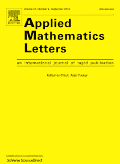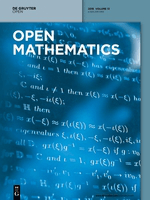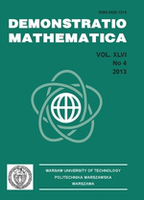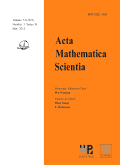
Proceedings of the Institute of Mathematics and Mechanics
Scope & Guideline
Exploring New Dimensions in Mathematics and Mechanics
Introduction
Aims and Scopes
- Mathematical Analysis and Differential Equations:
The journal focuses on the study of both ordinary and partial differential equations, including their boundary value problems, stability analysis, and asymptotic behaviors, which are crucial for understanding dynamic systems. - Numerical Methods and Algorithms:
Significant attention is given to the development and analysis of numerical methods for solving complex mathematical problems, including collocation methods, finite element methods, and approximation techniques. - Control Theory and Optimization:
Research in control theory, particularly related to differential inclusions and optimal control problems, is a core area, reflecting the journal's commitment to applied mathematics in engineering and physical sciences. - Fractional Calculus and Nonlinear Dynamics:
The journal explores the applications of fractional calculus in various contexts, including biological models and stochastic processes, contributing to the understanding of non-local phenomena. - Functional Analysis and Operator Theory:
Papers on operator theory, including spectral theory and the study of various function spaces, are prevalent, indicating a strong mathematical foundation in functional analysis. - Geometric and Algebraic Methods:
The journal includes research on geometric structures, such as Sasakian metrics and manifold theory, showcasing the interplay between geometry and analysis. - Mathematical Modeling and Simulation:
The journal encourages research that involves mathematical modeling of real-world phenomena, including population dynamics and physical processes, thereby bridging pure and applied mathematics.
Trending and Emerging
- Fractional Differential Equations:
An increasing number of papers focus on fractional calculus, particularly in modeling phenomena that exhibit memory and non-locality, which is becoming increasingly relevant in various scientific fields. - Neural Networks and Machine Learning:
Research integrating neural networks and machine learning techniques with traditional mathematical problems is on the rise, reflecting the growing intersection of mathematics with artificial intelligence. - Nonlinear Dynamics and Chaos Theory:
There is a notable increase in studies related to nonlinear dynamics and chaos theory, indicating a growing interest in understanding complex systems and their behaviors. - Mathematical Biology and Epidemiology:
The journal is publishing more papers that apply mathematical modeling to biological and epidemiological problems, particularly in light of recent global health challenges. - Optimization in Complex Systems:
Emerging themes in optimization, particularly in systems governed by partial differential equations and boundary value problems, highlight the journal's focus on practical applications in engineering and technology.
Declining or Waning
- Classical Mathematical Models:
There has been a noticeable decline in papers focusing on classical mathematical models that do not incorporate modern computational techniques or interdisciplinary applications, reflecting a shift towards more innovative approaches. - Elementary Number Theory:
Research in elementary number theory seems to be less prevalent, indicating a potential waning interest in purely theoretical explorations without application to broader mathematical or scientific contexts. - Static Systems in Mechanics:
The journal has seen fewer contributions related to static mechanical systems, suggesting a trend towards dynamic systems and time-dependent analyses that are more relevant to current research challenges. - Traditional Approximation Theory:
While approximation theory remains important, traditional methods without modern advancements or applications in machine learning and data science appear to be less frequently published.
Similar Journals

Journal of Applied Mathematics and Computing
Pioneering Research in Applied Mathematics and ComputingThe Journal of Applied Mathematics and Computing, published by SPRINGER HEIDELBERG, is a premier open-access journal dedicated to the advancements and interdisciplinary applications of mathematical theory and computing techniques. Since its inception in 1997, this journal has become a vital resource for researchers and practitioners, contributing significantly to the fields of Applied Mathematics and Computational Mathematics, currently positioned in the Q2 category as per the 2023 metrics. With an impressive Scopus ranking of #130 out of 635 in Applied Mathematics and #48 out of 189 in Computational Mathematics, it reflects a robust academic influence and a dedication to high-quality research dissemination. The journal's accessibility as an open-access resource since 2002 ensures that its groundbreaking findings are available to a global audience, fostering collaboration and innovation in the mathematical sciences. Based in Heidelberg, Germany, the journal continues to invite contributions that push the boundaries of both theory and practical applications, making it an essential platform for scholars, professionals, and students alike.

Applied Mathematics Letters
Connecting Scholars to Cutting-Edge Mathematical DiscoveriesApplied Mathematics Letters is a prestigious journal dedicated to the dissemination of significant research in the field of applied mathematics. Published by PERGAMON-ELSEVIER SCIENCE LTD in the United Kingdom, this journal serves as a vital resource for researchers, professionals, and students alike, aiming to bridge theoretical findings and practical applications. With an impressive impact factor placing it in the Q1 category and ranked 33 out of 635 in the Applied Mathematics category by Scopus, it showcases influential articles that contribute to advancements across various applications of mathematics. The journal's coverage from 1988 to 2025 ensures a rich archive of research that remains relevant and insightful for contemporary studies. Currently, it operates under a subscription-based model, providing access to cutting-edge research that forms the backbone of mathematical application in science and engineering. To become part of this dynamic community of scholars, readers are encouraged to explore the latest findings and ongoing discussions that highlight the interplay between mathematics and its real-world impacts.

Trudy Instituta Matematiki i Mekhaniki UrO RAN
Pioneering Research in Computational Mechanics and MathematicsTrudy Instituta Matematiki i Mekhaniki UrO RAN, a prestigious journal published by the KRASOVSKII INST MATHEMATICS & MECHANICS URAL BRANCH RUSSIAN ACAD SCIENCES, serves as a vital platform for the dissemination of research in the diverse fields of applied mathematics, computational mechanics, and computer science applications. With a dedicated focus on advancing theoretical and practical applications within these disciplines, the journal emphasizes innovative methodologies and novel concepts that are crucial in an era where mathematical techniques are increasingly intertwined with emerging technologies. Although currently not an open-access publication, the journal caters to a niche yet expansive audience of researchers, academics, and professionals, providing insights into current trends and breakthroughs. Notably, it holds a commendable position in various quartiles — Q3 in Applied Mathematics and Q2 in Computational Mechanics as of 2023, reflecting its growing influence within the scientific community. While its Scopus rankings indicate a competitive landscape, this journal continues to be a significant resource for scholarly discourse, making substantial contributions to the body of knowledge for its readers based in the Russian Federation and beyond.

Research in Mathematics
Transforming ideas into impactful mathematical solutions.Research in Mathematics, published by TAYLOR & FRANCIS LTD, is an emerging academic journal dedicated to advancing the field of mathematics through innovative research and scholarship. With an E-ISSN of 2768-4830, this journal aims to foster discussion and dissemination of high-quality mathematical research across a broad spectrum of disciplines, including pure mathematics and applied mathematics. As part of its commitment to accessibility, Research in Mathematics operates on an open-access model, allowing researchers, professionals, and students to engage with groundbreaking studies without barriers. Despite its recent establishment since 2016, and with a current Scopus ranking that positions it in the lower percentile among its peers, the journal offers a platform for new voices in the mathematics community. Its objectives include enhancing visibility for novel mathematical concepts, methodologies, and applications that can significantly impact the academic and professional landscapes. Authors are encouraged to submit original research articles, review papers, and case studies that push the boundaries of mathematical knowledge.

Russian Mathematics
Discovering New Horizons in Mathematical ResearchRussian Mathematics is an esteemed journal published by PLEIADES PUBLISHING INC, specializing in the field of mathematics. With its ISSN 1066-369X and E-ISSN 1934-810X, this journal serves as a vital platform for disseminating innovative research and advancements in various branches of mathematics. Established in 1992, it has earned its place in the Q2 category of the mathematics (miscellaneous) discipline, reflecting its growing influence and reputation within the academic community. Although it is not an open-access journal, its rigorous selection process ensures that only high-quality research is published, making it an invaluable resource for researchers, professionals, and students seeking in-depth insights into mathematical theories and applications. The journal has documented its evolution through a converged years format from 2010 to 2024, emphasizing its commitment to fostering scholarly discourse. With its address located at PLEIADES HOUSE, 7 W 54 ST, NEW YORK, NY 10019, UNITED STATES, Russian Mathematics is poised to contribute significantly to the global mathematical community.

Open Mathematics
Unlocking Innovative Insights in MathematicsOpen Mathematics, published by DE GRUYTER POLAND SP Z O O, is a prominent peer-reviewed journal that has been a vital platform for disseminating innovative research in the field of mathematics since its inception in 2015. With an impressive impact factor reflected by its Q2 ranking in the miscellaneous mathematics category and a commendable Scopus rank of #91 out of 399, it positions itself as a significant contributor to the mathematical community. This open access journal, headquartered in Poland, welcomes submissions that tackle diverse mathematical theories, applications, and methodologies, fostering knowledge exchange among researchers, professionals, and students globally. Since its launch, Open Mathematics has focused on bridging the gap between theoretical advancement and practical applications, making it an essential resource for anyone seeking to stay at the forefront of mathematical research and innovation. The journal offers easy online access, enhancing the visibility and impact of the valuable work published within its pages.

APPLIED MATHEMATICS AND OPTIMIZATION
Unveiling the Power of Mathematics in OptimizationApplied Mathematics and Optimization, published by Springer, is a prestigious journal dedicated to the rigorous exploration of applied mathematics, optimization techniques, and their multifaceted applications. Since its inception in 1974, the journal has maintained a robust reputation within the academic community, achieving a commendable Q1 ranking in both Applied Mathematics and Control and Optimization categories as of 2023. With an impact factor that underscores its influence in the field, the journal provides a platform for researchers and practitioners to disseminate innovative methodologies and significant advancements. While it does not offer Open Access, the journal’s esteemed peer-reviewed articles serve as invaluable resources for the advancement of theoretical knowledge and practical applications. Researchers, professionals, and students alike will find Applied Mathematics and Optimization an essential source for staying at the forefront of mathematical sciences, particularly in optimizing real-world systems and processes.

Demonstratio Mathematica
Nurturing a Global Community of MathematiciansDemonstratio Mathematica, published by DE GRUYTER POLAND SP Z O O, is an esteemed open-access journal in the field of mathematics, with an ISSN of 0420-1213 and E-ISSN 2391-4661. Established in 1996 and providing open access since 2009, it has become a vital platform for disseminating innovative research and advancements in various areas of mathematics. With a commendable Scopus ranking of 85/399 in General Mathematics and a 2023 Category Quartile of Q2, it stands at the forefront of the mathematical community, demonstrating a significant impact within the top 78th percentile. The journal aims to foster a deeper understanding and appreciation of mathematical concepts and their applications, catering to both seasoned researchers and emerging scholars. Located in Warsaw, Poland, Demonstratio Mathematica not only enriches the academic discourse but also strengthens collaborative efforts within the international mathematics community, making it an essential resource for those seeking to expand their knowledge and research output.

Bulletin of the Karaganda University-Mathematics
Pioneering Research in Theoretical and Applied MathematicsBulletin of the Karaganda University-Mathematics is a distinguished journal dedicated to the exploration and dissemination of research in the field of mathematics. Published by KARAGANDA STATE UNIVERSITY in Kazakhstan, this Open Access journal has been promoting the accessibility of scientific knowledge since 2010. With an ISSN of 2518-7929, the journal aims to provide a platform for innovative ideas and developments across various mathematical disciplines. Recognized for its quality, it has achieved a Q3 ranking in the Mathematics (miscellaneous) category for 2023 and is currently positioned at the 46th percentile within Scopus rankings, demonstrating its relevance and contribution to the academic community. The bulletin encourages submissions that enrich theoretical and applied mathematics and is an essential resource for researchers, professionals, and students looking to enhance their understanding and application of mathematical concepts. Addressed from 38 GOGOL STR, KARAGANDA 100012, KAZAKHSTAN, the journal not only represents the academic excellence of its home institution but also aims to foster international collaboration and knowledge exchange.

ACTA MATHEMATICA SCIENTIA
Cultivating Excellence in Interdisciplinary ResearchACTA MATHEMATICA SCIENTIA is a reputable academic journal published by Springer, primarily focusing on the interdisciplinary fields of mathematics and physics. With an ISSN of 0252-9602 and an E-ISSN of 1572-9087, the journal has established itself as an influential platform for researchers and professionals seeking to disseminate novel findings in these domains. Based in the Netherlands, the journal holds a commendable Q2 category ranking in both Mathematics and Physics & Astronomy for 2023, reflecting its significance in the academic community. With a focus extending from 1996 to 2024, ACTA MATHEMATICA SCIENTIA serves as a vital resource for scholars, offering insights that bridge theoretical and applied sciences. Published under rigorous peer review, the journal fosters a robust scholarly dialogue and encourages innovative research that challenges existing paradigms. While access is not open, the journal's contributions are of paramount importance for advancing knowledge in the mathematical sciences and their applications in physical contexts.